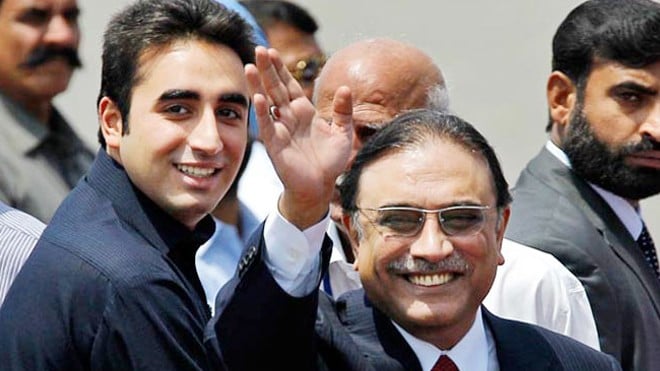
Is return of Zardari and sidelining of Bilawal part of a strategy to reorganise and restructure the PPP for the 2018 elections?

The news of Irfanullah Marwat, a PML-N member of the Sindh assembly from Karachi, to join the PPP after a meeting with Asif Ali Zardari in late February, had generated much criticism among the top ranks of the party. They say how can a man who was not only involved in forcibly changing party loyalties during Jam Sadiq Ali’s government in 1990s but was also implicated in the Veena Hayat gang rape case be allowed to enter the party.
Even daughters of Zardari, Bakhtawar and Aseefa, expressed their displeasure over Marwat joining the PPP fold on social media.
Analysts and party insiders believe that Marwat’s decision to unite with the PPP was part of a strategy to woo heavyweights from Sindh, including Karachi.
The process to lure established politicians, whether tribal chieftains or rival political parties leaders, in Sindh and Punjab, has been accelerated after the return of Zardari to the country from over a year-long self-exile. Experts see this as a run-up to the 2018 elections. The Pakistan Muslim League- Functional’s MPAs Imtiaz Shaikh and Jam Madad Ali, former MNA Nabeel Gabol, former State Minister Abdul Hakeem Baloch and Pakistan Tehreek-e-Insaf’s former Sindh President Nadir Akmal Leghari are prominent among those that recently switched their loyalties to the PPP.
But, enticing leading politicians to join the party aside, it is largely believed that Zardari has once again taken charge of the party and pushed Bilawal to a side.
Mehrab Baloch, a PPP activist in Karachi’s Lyari, says that Bilawal was trying to restore people’s confidence in the party by reaching out to them and by replacing Qaim Ali Shah with Murad Ali Shah to improve the Sindh government’s awful performance. "But his father [Zardari] has brought in politicians that either betrayed the party or committed excesses," he says while expressing displeasure over the re-entry of Gabol.
Salman Masood, resident editor of The Nation, Islamabad, says that the perception of rifts between Zardari and Bilawal has hurt the party image and confused the party members about who to side with. "Bilawal shows spark, talks promisingly about change, but he has taken a backseat in recent months, and has disappointed his supporters who want a young leader to take charge."
But would it be truthful to suggest that Asif Ali Zardari himself brought his son Bilawal to the fore? Sartaj Khan, a Karachi-based political analyst, says Zardari has not lost control over the party since the assassination of Benazir Bhutto. "What is being presented as change in the leadership was an attempt to calm the dissent within the party circles and criticism from outside once party suffered defeat in the 2013 general polls".
He adds, "The PPP needs Bilawal to lead from the front to attract voters in the name of Bhuttos".
Waqar Mehdi, the PPP Sindh’s secretary general, disagrees. "In fact, Bilawal is leading the party. Zardari has been supporting his efforts and initiatives."
The real challenge for the PPP is to revive the party in the rest of the country, especially in Punjab, where the PPP has been virtually wiped out because of several reasons, provincial leadership crisis a key one.
After the 2013 polls and the emergence of the PTI as an effective political party at the national level and in Punjab, the PPP has been restricted to rural Sindh only. The PPP leadership though is working hard to change this dynamic in the upcoming polls.
Salman Masood says there have been repeated calls for reorganising and restructuring the PPP, without a coherent and a well-directed campaign. "The party is in a state of paralysis, especially in Punjab. Its mid-tier leadership is either disputed or incapable. A lot of local PPP leaders express frustration and helplessness, many of whom want to take a more aggressive role in opposition politics".
However, Mehdi says that Bilawal and Zardari both have been busy in re-structuring the party and mobilising the workers in Central and South Punjab. "Re-structuring the party will help us to win the upcoming polls. The party has faced bigger challenges in the past but it has ability to overcome it".